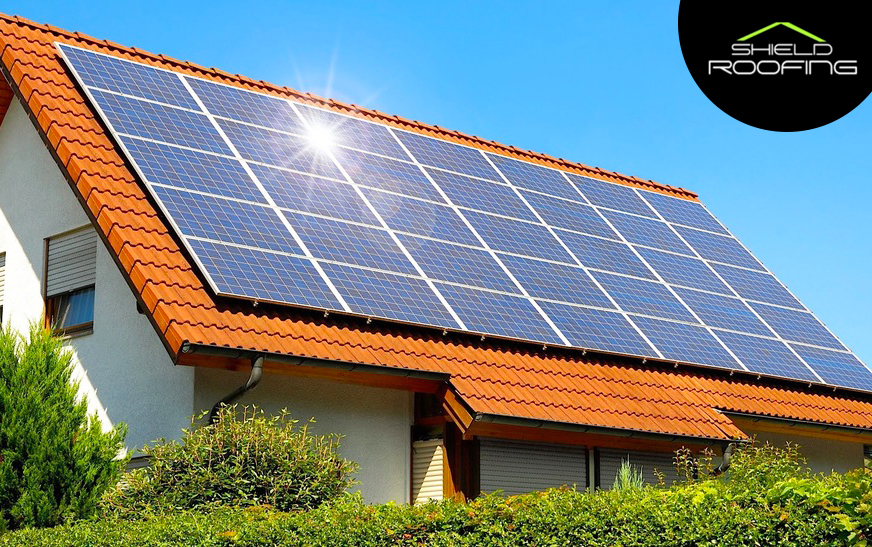Installing solar panels on your home’s roof can provide numerous benefits, ranging from cost savings to environmental protection. It is a growing trend in many parts of the world and an important component of sustainable living.
Solar panel systems are becoming increasingly popular for residential homes due to their potential for both financial and ecological gains. Solar panel technology has gone through various advancements over the years which have made installation more affordable than ever before.
This article explains why it makes sense to invest in solar panel installation for one’s home, detailing all the associated economic and ecological advantages that come with such a decision.
Cost Savings
The installation of solar panels on a home’s roof can provide numerous financial benefits. One of the most obvious advantages is reduced bills, as energy generated from the sun will replace electricity purchased from an utility company.
Additionally, installing rooftop solar panels offers homeowners greater control over their energy costs, allowing them to save money by generating their own renewable power and potentially even earn income through net metering or other incentive programs.
Making the switch to using solar panel technology also provides other significant cost savings opportunities in addition to lower monthly electric bills.
For instance, many states have enacted tax credits that help defray some of the upfront costs associated with purchasing and installing a system; these incentives may result in significant long-term savings for those who take advantage.
Increased Home Value
Installing solar panels on a home’s roof can provide long-term return on investment (ROI) in terms of increased property value.
Solar energy is rapidly becoming more popular with homeowners, and adding a system to the house may make it easier for buyers when looking at properties.
Additionally, being able to market the home as ‘green’ or environmentally friendly could significantly increase its appeal.
The potential financial savings associated with lower electricity bills should also be taken into consideration.
Depending on where you live, local state laws generally allow people who generate their own power through solar panels to sell any excess back to utility companies.
In other words, this means that homeowners have an opportunity to turn their rooftops into money-making ventures while still decreasing reliance on traditional sources of energy and having a positive environmental impact.
Reduced Carbon Footprint
Installing solar panels on a home’s roof is an environmentally friendly step that can help to reduce emissions. This form of green energy helps create clean, renewable electricity with minimal impact on the environment.
Solar power produces no air or water pollution and emits no greenhouse gases in its operation. The use of solar energy systems reduces reliance on fossil fuels, decreases need for costly electrical grid system upgrades, and helps conserve natural resources such as coal, oil and gas reserves.
The installation of solar panels also allows for reduced carbon dioxide (CO2) emissions. CO2 is one of the primary contributors to global climate change which has been linked to severe weather patterns around the world. Decreasing CO2 output by substituting it with renewable sources like solar energy will significantly improve air quality while helping mitigate negative environmental impacts from fossil fuel-based power production.
By installing solar panels, homeowners have the opportunity to make a positive contribution towards reducing their carbon footprint.
Tax Incentives
The implementation of solar energy in homes can significantly reduce the financial burden of electricity bills. In addition, there are tax incentives available for homeowners who choose to install solar panels on their roofs.
Net metering allows customers to offset a portion of the cost associated with purchasing renewable energy equipment by selling or trading excess energy back to utilities. Energy storage technologies also allow users to store surplus power generated from solar panels and use it during peak hours when rates are higher than average. These techniques help increase savings for homeowners while still providing sufficient power throughout the day.
As an added bonus, installing solar panels may qualify a homeowner for state and federal rebates which could further reduce installation costs. With these benefits in mind, transitioning to renewable energy sources such as solar is becoming increasingly accessible and desirable amongst households looking to save money on electricity bills and do their part in reducing carbon emissions.
Improved Aesthetics
The addition of solar panels to a home can provide more than just energy savings. They can also offer improved aesthetics, providing added visual appeal and an attractive design.
With many panel styles available in different shapes, sizes, colors, and materials; homeowners have the opportunity to customize their rooftop with a look that complements the rest of the house’s style. Solar panels come in designs that are sleek and contemporary or classic and rustic, allowing for versatility when creating beauty on any roof.
With their practical applications as well as aesthetic benefits, installing solar panels is a wise investment for any homeowner looking to enhance both the functionality and appearance of their property. Not only will they reduce electricity bills but they can also add value to your home over time by improving its overall curb appeal.
Durability And Reliability
The durability and reliability of solar panels is a key factor in the overall value they provide to homeowners. Solar panel systems require minimal maintenance, making them an ideal long-term source of energy security for households.
As such, it is important that homeowners are aware of their system’s lifespan before investing in one. On average, most solar photovoltaic (PV) modules have a 25-year warranty or longer; this means that if properly taken care of, your PV system should last at least as long as its warranty period—and possibly even longer with proper maintenance.
In addition to their longevity and stability, these systems will also result in lower electricity bills over time due to reduced dependence on traditional utility companies. This allows you to maximize your savings while reducing your environmental impact.
Energy Independence
Having discussed the durability and reliability of solar panels, it is also important to consider how their installation supports energy independence.
Solar technology provides a unique ability for homeowners to produce electricity from local renewable energy sources rather than relying on traditional power plants feeding into the grid. This offers not only financial savings but can help reduce air pollution significantly in areas with high levels of smog.
By using solar cells instead of conventional electricity generation methods, home owners are taking an active role in contributing to a cleaner environment by reducing emissions that would otherwise be released when burning fossil fuels such as coal and oil.
Moreover, solar technology allows individuals to have greater control over their energy supply since they are able to generate power without relying on external energy sources or companies.
Therefore, installing solar panels not only helps save money but also reduces environmental impact while providing an additional layer of self-sufficiency and independence.
Conclusion
Installing solar panels on the roof of one’s home not only has a plethora of advantages, but also provides an opportunity for homeowners to become further independent from traditional electricity sources.
The cost savings associated with installing solar panels have been well documented as they provide an effective way to reduce energy costs in both residential and commercial settings.
Additionally, research has demonstrated that the installation of these systems can increase the value of one’s home while simultaneously reducing their carbon footprint.


